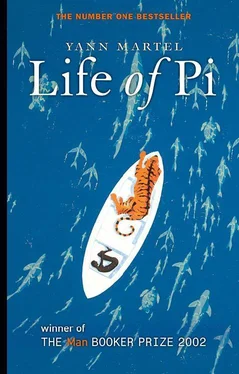I wept like a child. It was not because I was overcome at having survived my ordeal, though I was. Nor was it the presence of my brothers and sisters, though that too was very moving. I was weeping because Richard Parker had left me so unceremoniously. What a terrible thing it is to botch a farewell. I am a person who believes in form, in the harmony of order. Where we can, we must give things a meaningful shape. For example—I wonder—could you tell my jumbled story in exactly one hundred chapters, not one more, not one less? I’ll tell you, that’s one thing I hate about my nickname, the way that number runs on forever. It’s important in life to conclude things properly. Only then can you let go. Otherwise you are left with words you should have said but never did, and your heart is heavy with remorse. That bungled goodbye hurts me to this day. I wish so much that I’d had one last look at him in the lifeboat, that I’d provoked him a little, so that I was on his mind. I wish I had said to him then—yes, I know, to a tiger, but still—I wish I had said, “Richard Parker, it’s over. We have survived. Can you believe it? I owe you more gratitude than I can express. I couldn’t have done it without you. I would like to say it formally: Richard Parker, thank you. Thank you for saving my life. And now go where you must. You have known the confined freedom of a zoo most of your life; now you will know the free confinement of a jungle. I wish you all the best with it. Watch out for Man. He is not your friend. But I hope you will remember me as a friend. I will never forget you, that is certain. You will always be with me, in my heart. What is that hiss? Ah, our boat has touched sand. So farewell, Richard Parker, farewell. God be with you.”
The people who found me took me to their village, and there some women gave me a bath and scrubbed me so hard that I wondered if they realized I was naturally brown-skinned and not a very dirty white boy. I tried to explain. They nodded and smiled and kept on scrubbing me as if I were the deck of a ship. I thought they were going to skin me alive. But they gave me food. Delicious food. Once I started eating, I couldn’t stop. I thought I would never stop being hungry.
The next day a police car came and brought me to a hospital, and there my story ends.
I was overwhelmed by the generosity of those who rescued me. Poor people gave me clothes and food. Doctors and nurses cared for me as if I were a premature baby. Mexican and Canadian officials opened all doors for me so that from the beach in Mexico to the home of my foster mother to the classrooms of the University of Toronto, there was only one long, easy corridor I had to walk down. To all these people I would like to extend my heartfelt thanks.
PART THREE
Benito Juárez Infirmary, Tomatlán, Mexico

Mr. Tomohiro Okamoto, of the Maritime Department in the Japanese Ministry of Transport, now retired, told me that he and his junior colleague at the time, Mr. Atsuro Chiba, were in Long Beach, California—the American western seaboard’s main container port, near L.A.—on unrelated business when they were advised that a lone survivor of the Japanese ship Tsimtsum, which had vanished without a trace in Pacific international waters several months before, was reported to have landed near the small town of Tomatlán, on the coast of Mexico. They were instructed by their department to go down to contact the survivor and see if any light could be shed on the fate of the ship. They bought a map of Mexico and looked to see where Tomatlán was. Unfortunately for them, a fold of the map crossed Baja California over a small coastal town named Tomatán, printed in small letters. Mr. Okamoto was convinced he read Tomat lán. Since it was less than halfway down Baja California, he decided the fastest way to get there would be to drive .
They set off in their rented car. When they got to Tomatán, eight hundred kilometres south of Long Beach, and saw that it was not Tomatlán, Mr. Okamoto decided that they would continue to Santa Rosalia, two hundred kilometres further south, and catch the ferry across the Gulf of California to Guaymas. The ferry was late and slow. And from Guaymas it was another thirteen hundred kilometres to Tomatlán. The roads were bad. They had a flat tire. Their car broke down and the mechanic who fixed it surreptitiously cannibalized the motor of parts, putting in used parts instead, for the replacement of which they had to pay the rental company and which resulted in the car breaking down a second time, on their way back. The second mechanic overcharged them. Mr. Okamoto admitted to me that they were very tired when they arrived at the Benito Juárez Infirmary in Tomatlán, which is not at all in Baja California but a hundred kilometres south of Puerto Vallarta, in the state of Jalisco, nearly level with Mexico City. They had been travelling non-stop for forty-one hours. “We work hard,” Mr. Okamoto wrote .
He and Mr. Chiba spoke with Piscine Molitor Patel, in English, for close to three hours, taping the conversation. What follows are excerpts from the verbatim transcript. I am grateful to Mr. Okamoto for having made available to me a copy of the tape and of his final report. For the sake of clarity I have indicated who is speaking when it is not immediately apparent. Portions printed in a different font were spoken in Japanese, which I had translated .
“Hello, Mr. Patel. My name is Tomohiro Okamoto. I am from the Maritime Department in the Japanese Ministry of Transport. This is my assistant, Atsuro Chiba. We have come to see you about the sinking of the ship Tsimtsum , of which you were a passenger. Would it be possible to talk to you now?”
“Yes, of course.”
“Thank you. It is very kind of you. Now, Atsuro-kun, you’re new at this, so pay attention and seek to learn.”
“Yes, Okamoto-san.”
“Is the tape recorder on?”
“Yes, it is.”
“Good. Oh, I’m so tired! For the record, today is February 19th, 1978. Case file number 250663, concerning the disappearance of the cargo ship Tsimtsum.Are you comfortable, Mr. Patel?”
“Yes, I am. Thank you. And you?”
“We are very comfortable.”
“You’ve come all the way from Tokyo?”
“We were in Long Beach, California. We drove down.”
“Did you have a good trip?”
“We had a wonderful trip. It was a beautiful drive.”
“I had a terrible trip.”
“Yes, we spoke to the police before coming here and we saw the lifeboat.”
“I’m a little hungry.”
“Would you like a cookie?”
“Oh, yes!”
“Here you go.”
“Thank you!”
“You’re welcome. It’s only a cookie. Now, Mr. Patel, we were wondering if you could tell us what happened to you, with as much detail as possible.”
“Yes. I’d be happy to.”
The story.
Mr. Okamoto: “Very interesting.”
Mr. Chiba: “What a story.”
“He thinks we’re fools.Mr. Patel, we’ll take a little break and then we’ll come back, yes?”
“That’s fine. I’d like another cookie.”
“Yes, of course.”
Mr. Chiba: “He’s already had plenty and most he hasn’t even eaten. They’re right there beneath his bedsheet.”
Читать дальше













